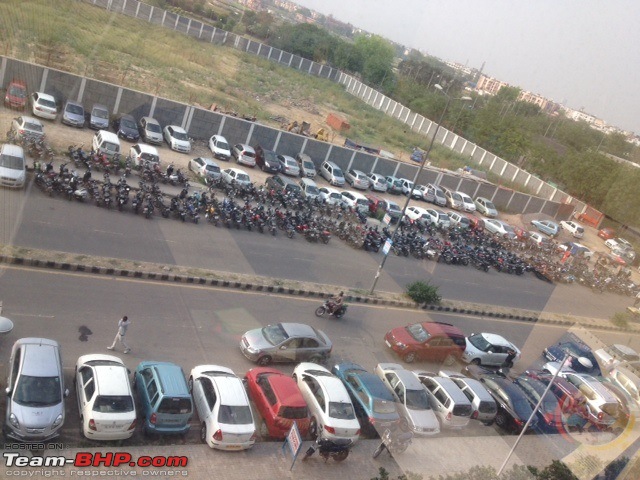Quote:
Originally Posted by mints21  But, I think that an area that requires maximum attention is still being ignored. The area that I am talking about is the parking.
This is largely contributing to the killing of driving enthusiasm. It is also leading to cars getting scratched at parking lots, stolen from parking lots and the newbie parking attendants learning driving using our cars.
I came across this thought while sitting in my office and looking down from the window of my working desk.
One can see the impact that they make on our driving. Please suggest ways how can we tackle this problem as the number of cars would continue to grow but the space on road will always remain limited. Ever wondered, Why do the authorities choose to still look the other way around instead of addressing this ever increasing problem. |
Interesting topic. I don't have a solution to the problem, but I have some insights as to how many other countries are tackling this problem.
In essence, many (Western) countries have a very active "discourage car usage policies and law". In many European laws the respective building regulation stipulate how much parking space per office m2 you are allowed. And it is a ridiculously low number.
In most congested cities around the world, you will find that the authorities take active measure to reduce the number of cars coming into the city. I visited Singapore for the very first time in 1979 and already then cars with an even registration number were allowed into Singapore and cars with odd registration numbers were allowed in on the other days.
Cities such as London, Stockholm have introduced "congestion charges". i.e. very high charges/fees for anybody going into the city centre. In Amsterdam parking in the city centre cost around Euro 6 -7 per hour (500-600 INR/hour). trust me, you park to go and get lunch, you will have spend more on parking fees then on lunch.
Only in places where there are no traffic jams and space is available by the bucket load will you find a different approach. I lived in Kansas City for three years and my office was in one of the main suburbs Overland Park. I worked on a campus that accommodate just over 30.000 individuals, and every single one of us could park our car easily! Space was not an issue
So in general congested cities the world around will promote to leave the car at home and travel to the office by means of public transportation. Bus, train, metro etc. And most of them have been expanding those network extensively over the last decades.
There is a very noticeable shift these days in car ownership in the western world. Young people don't care about cars, as long as they have good public transport obviously. None of my three children have a car and the eldest is nearly thirty and has an excellent job. It just doesn't have his interest. Few of his friends and colleagues do either. They will hire one when needed, but they are simply not interested in owning one. Very different from the situation here in India where many aspire to own their first real car. Call it decadent or progress, but societies do go through different phases. And probably, car ownership, or the ability to have your own car, is extremely relevant for millions of Indian. Probably partly because of inadequate, perceived or real, lack of public transport and partly because it is just something you want to have. I can certainly remember the first cars I bought and how proud I was. Drove it all over the Netherlands to show everybody. We are talking late 70's so long before Facebook. So you actually had to go to see family and friends to tell them, rather then to take a picture and put it up for 500+ friends to see it on your FB page.
For some, the obvious solution is to built more roads and more parking facilities. Studies and decades of experience in many different countries has shown that by increasing the roads and parking you will ultimately only increase the problem. So the sooner you start providing good, reliable, affordable, reliable public transportation the better it is. Easier said then done, as always. in practice you will probably need to do both.
I have no idea what the formal policies on this topic are in India. But at the rate this country is growing, it is difficult to imagine how we are ever going to cope with all these cars. Personally, I don't think building road and parking places is the answer. They will just fill up as quickly as you can build them!
There is of course, another reasons why so many cities around the world try and keep as many cars out of the city centre, through various means. It's pollution. Environmental concern is a very big very relevant topic in many countries. Germany has introduced laws that will only allow relatively new cars into city centers. So, I can't take my classic W123 Mercedes into most German cities anymore. Similar legislation is in the making in several cities in the Netherlands.
Jeroen
 (19)
Thanks
(19)
Thanks

 (1)
Thanks
(1)
Thanks

 (3)
Thanks
(3)
Thanks
 (1)
Thanks
(1)
Thanks
 (1)
Thanks
(1)
Thanks

 (1)
Thanks
(1)
Thanks

 (1)
Thanks
(1)
Thanks
 (1)
Thanks
(1)
Thanks
 (6)
Thanks
(6)
Thanks

 (11)
Thanks
(11)
Thanks

 (1)
Thanks
(1)
Thanks
 (1)
Thanks
(1)
Thanks
 (1)
Thanks
(1)
Thanks
 (1)
Thanks
(1)
Thanks
 (1)
Thanks
(1)
Thanks













 taking all liberties and indulging in hap hazard parking many a time, putting others into inconvenience.
taking all liberties and indulging in hap hazard parking many a time, putting others into inconvenience.
 :
:

